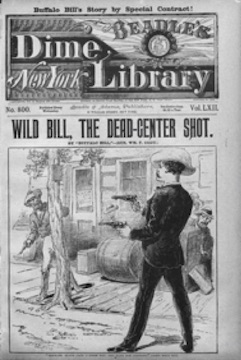Wild Bill Hickok as Lawman
Wild Bill Hickok was a sometime lawman, but he would have a tough job finding work in the criminal justice field today. His resume was shaky. He’d been tried, and acquitted, several times for murder and manslaughter. Police brutality was, in his time, a job expectation.
Hickok got his start as a constable for the town of Monticello, Kansas, in 1858. During the Civil War he occasionally was a military policeman, and after the war a deputy U.S. marshal. His main duties were tracking down deserters, investigating the theft of military supplies, and locating government horses and mules that had gone missing.
With this background he spent a few months as sheriff of Ellis County, Kansas, where he shot a couple of men and clubbed many more before losing an election. On April 15, 1871, he became marshal of Abilene, Kansas. He served for about seven months in the rowdy cattle town and was fired. During his tenure he famously shot and killed the gambler Phil Coe, and accidently shot and killed his friend Mike Williams, a security guard who was trying to assist Hickok maintain order.
Some stories claim Hickok had been offered the job of sheriff of Deadwood, the town where he was murdered during a card game. Conspiracy theorists claimed a consortium of gambling interests ordered Hickok’s death to protect their businesses.
As a lawman, Hickok was expected to main order in some of the roughest precincts in the United States. Prostitution, gambling, drinking and corruption were rampant in cattle towns and areas near army bases. Hickok was a visible presence in the saloons where most of the trouble originated. The wounds left by the war still festered, and many of the cowboys came from Texas. Hickok was a Union man with a big reputation, which made him a lightning rod for violence. He didn’t look for trouble but obliged when his hand was forced.
————
For more on Wild Bill, read Imaging Wild Bill: James Butler Hickok in War, Media, and Memory by Paul Ashdown and Edward Caudill, available from Southern Illinois University Press as part of Emerging Civil War’s “Engaging the Civil War” Series.

Wasn’t Mike Williams his deputy sheriff? I have never heard him referred to as a “security guard.” That is a modern term.
Williams was the last man Hickok ever killed and his death began a long downward spiral for Hickok that finally ended in Deadwood five years later.